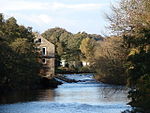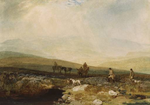Addingham (formerly Haddincham c. 972, Odingehem 1086) is a village and civil parish in the City of Bradford in West Yorkshire, England. It is situated near the A65, 6 miles (10 km) south-east of Skipton, 3 miles (5 km) west of Ilkley, 12 miles (19 km) north-west of Bradford and around 20 miles (32 km) north-west of Leeds. Historically part of the West Riding of Yorkshire, it is located in the valley of the River Wharfe and is only 1 mile (2 km) from the Yorkshire Dales National Park. The name is thought to mean "homestead associated with a man called Adda", although in the Domesday Book, the village was referred to as "Ediham", which may have referred to Earl Edwin of Bolton Abbey. The 2001 census numbered Addingham's population at 3,599, increasing to 3,730 at the 2011 Census.The area around Addingham is thought to have been populated from at least Bronze Age times, indicated by the 'cup and ring' carved stones that can be found on Addingham Moor. Its beginnings may date back to the late Mesolithic period, as evidenced by the scattered remains of early flint tools across Rombald's Moor to the south.The earliest of the existing houses were built in the 17th century when the village was a farming community, but the real growth began in the late 18th century and early 19th century when the textile industry arrived and five working mills, plus other loomshops and weaving sheds, were established, and the village developed into a busy industrial community. The village grew up around three centres; Church Street in the east; The Green, about a mile away in the west; and the Old School in between. This is thought to be one of the reasons the village used to be known as "Long Addingham".
Since the decline of the textile industry during the 20th century, the village has now become largely a commuter and retirement community. It is home to an award-winning Medical Centre, a public park, four public houses, several retirement homes and a solitary school, Addingham Primary School.












